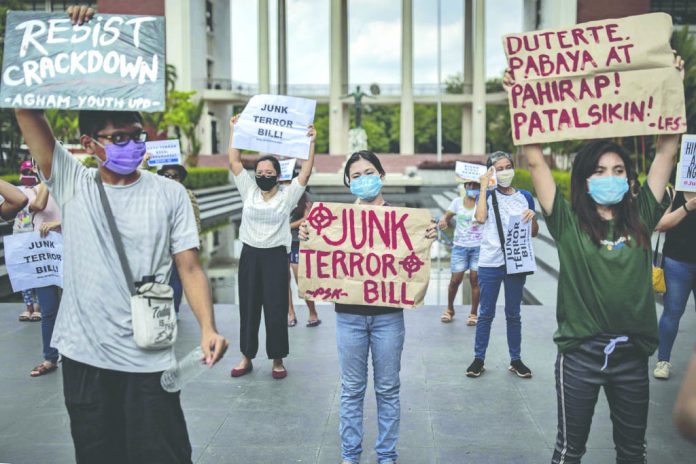
MANILA – The Philippine National Police (PNP) expressed alarm over the public assembly at University of the Philippines (UP) Diliman protesting the controversial Anti-Terrorism Bill.
PNP spokesperson Police Brigadier General Bernard Banac reminded the public Friday that mass gatherings, including protests, were still prohibited despite the easing of quarantine protocols in Metro Manila.
He added that the public assembly inside the UP campus on Thursday afternoon that the police organization was alarmed as the assembly has compromised the health of the public, including the protesters.
“We were alarmed at the mass action and public assembly at UP Diliman campus yesterday which was held while strict public health measures are still being implemented to stop the spread of COVID-19,” Banac said.
“As responsible Filipino citizens, we should avoid any opportunity for possible human to human transmission of a deadly virus that even UP scientists themselves are trying so hard to eradicate,” he added.
A mass protest was held in UP to denounce the controversial anti-terror bill, which is now up for President Rodrigo Duterte’s signature. There was also a protest held in Cebu City on Friday where the participants were arrested.
The proposed measure wants to extend the number of days suspected terrorists can be detained without a warrant of arrest – from three days under the current law to up to 14 days.
The bill also removed the provision under the Human Security Act that orders the payment of half a million pesos in damages for each day that a person wrongfully accused of terrorism is detained.
Any person who shall threaten to commit any act of terrorism, propose any terroristic acts or incite others to commit terrorism shall suffer the penalty of 12 years in prison under the bill.
The Senate has approved on February the Anti-Terrorism Act of 2020, which seeks to repeal the Human Security Act of 2007 with stronger measures to allow the government to curtail supposed acts of terror.
A counterpart measure was approved by the House of Representatives on third and final reading on Wednesday night clearing the way for President Duterte’s signature./PN



